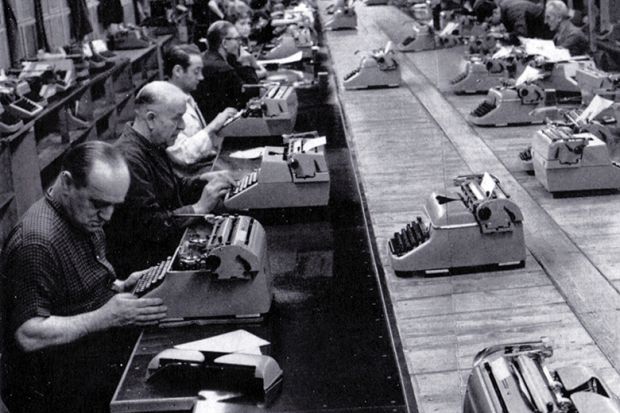The Irish government has announced the publication of a bill that paves the way for the prosecution of essay mills, including making it illegal to advertise contract cheating services, with observers urging the UK’s nations to follow suit.
Ireland is the latest country taking legal steps to tackle the growing problem of companies that write essays for students for a fee. In 2011, New Zealand made it illegal to “advertise or provide third party assistance to cheat”, and there are similar laws in 17 states in the US.
Among the provisions of the Irish bill is one for Quality and Qualifications Ireland, the country’s quality assurance agency, to initiate the prosecution of “essay mills”.
In a statement to Times Higher Education, a spokesman for Ireland’s Department of Education and Skills said that the new Qualifications and Quality Assurance Bill will make it an offence to provide cheating services, such as writing essays for students or sitting their exams.
It means that “those who advertise” such services “would also commit an offence, similarly, those who publish advertisements in relation to [those services] would also commit an offence”, the spokesman said.
Mary Mitchell O’Connor, Ireland’s minister for higher education, said that the legislation “will be initiated in the autumn”.
Thomas Lancaster, a senior teaching fellow in computing at Imperial College London, who has published research on essay mills, said that the bill was “an important development” in the drive to stamp them out.
“It is sending a strong message to providers of contract cheating that this is not acceptable, and it sends the same messages to the students considering using these methods,” he said. “It means we won’t see posters [advertising essay mills] getting on to campuses in Ireland and there is also some power to stop search engines such as Google or social media sites such as Facebook showing adverts for essay mills in the country. Though, of course, this will not apply to countries outside Ireland that do not have legislation.”
Dr Lancaster added: “Contract cheating is widespread, it has definitely increased over the past decade and the advertising is through the roof now...a bill like this would be so important for the UK too. People have tried to make these changes here but pushing legal responses through is difficult at the moment.”
In 2017, an amendment to the now Higher Education and Research Act proposed by the Liberal Democrat peer Lord Storey, aimed at tackling essay mills, failed to make it into the legislation. But the Quality Assurance Agency recently convened a working group on academic integrity, which will make recommendations to the government on how to prevent contract cheating.
Gareth Crossman, head of policy and public affairs at the QAA, said that the group would be watching Ireland’s bill passage closely. “We’ve identified it as a priority work stream for the academic advisory group, with a view to seeing if criminal sanctions can be applied in the UK,” he said.
Phil Newton, director of learning and teaching at the Swansea University Medical School, who proposed legislation to tackle essay mills in a 2017 paper, said that the Irish bill showed that the nation's government was “working hard to do the right thing and learning from the challenges in implementing laws in other countries”. He added that while other countries are pressing forward, the UK “risks falling behind”.
“At end of the day, you put the law on the books, even if you get it exactly right and even with the best will in the world, you aren't going to have dozens of prosecutions,” Professor Newton said. “But what you are going to have is a conversation with your students that says ‘these services are illegal’ and that is a very different conversation to the one we have now.”
He added that a similar advertising ban in the UK would have helped to prevent the flurry of essay mill advertising that popped up on the London Underground in 2016.
“Obviously, it is important to have a law on the books that works – and all the signals are there that Ireland understands this – but at the moment in the UK we have nothing,” Professor Newton said. “The [essay mill] companies are all licensed to Companies House and they use that in their advertising. To take that away would be really powerful.”
POSTSCRIPT:
Print headline: Irish essay mill law ‘could be model for UK’
Register to continue
Why register?
- Registration is free and only takes a moment
- Once registered, you can read 3 articles a month
- Sign up for our newsletter
Subscribe
Or subscribe for unlimited access to:
- Unlimited access to news, views, insights & reviews
- Digital editions
- Digital access to THE’s university and college rankings analysis
Already registered or a current subscriber?




